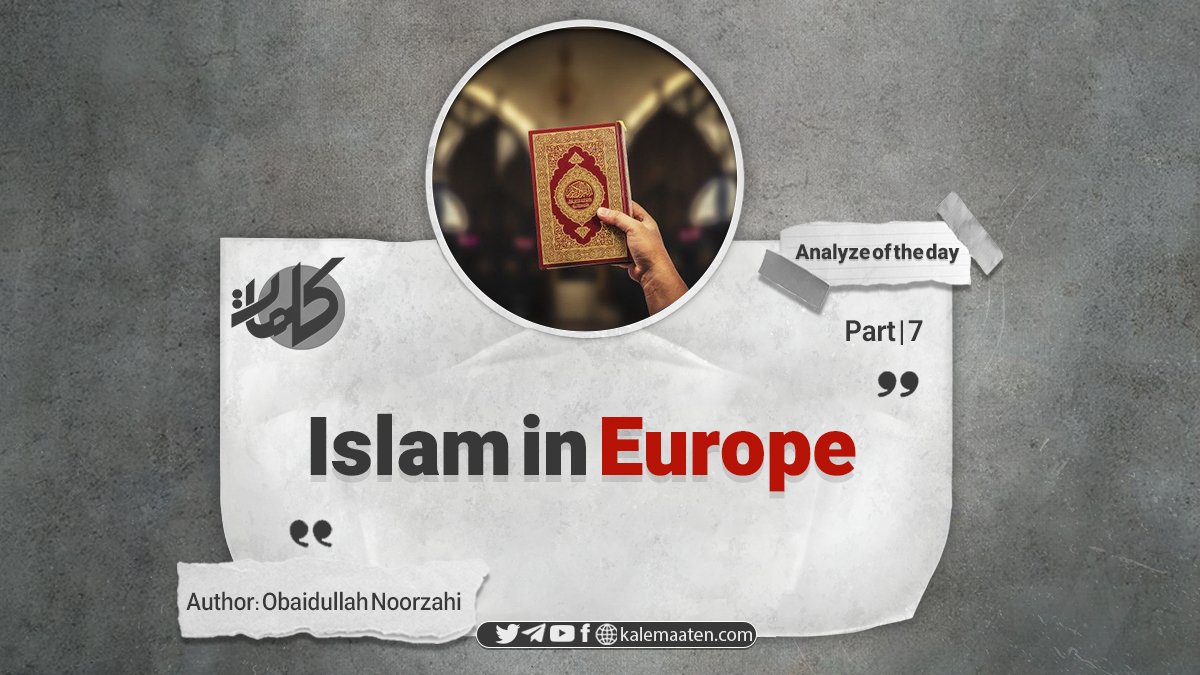
Author: Obaidullah Noorzahi
Islam in Europe (Part 7)
Islam in Al-Andalus: A Civilizational Brilliance Over Eight Centuries:
From 711 CE to 1492 CE, Islam established a flourishing civilization in Al-Andalus, a region comprising what is now Spain and Portugal. While Europe, under the tyranny of the Church, suppressed intellectual and scientific growth, Al-Andalus became a beacon of progress, development, and enlightenment under the auspices of Islam. Previously immersed in darkness, this region witnessed the growth of thought and the flourishing of knowledge with the advent of Islam.
Prominent scholars from Al-Andalus, through their intellectual endeavors and deep research, tore through the veils of ignorance and offered the light of knowledge to the world.
Before the Muslim conquest, Al-Andalus was ruled by the last Visigothic king, Roderic, a tyrannical and ruthless leader who seized power after deposing and killing his predecessor, Wittiza. Julian, the governor of Ceuta, outraged by Roderic’s treatment of his daughter, sought the help of Musa ibn Nusayr to liberate the region from Roderic’s clutches. The people of Al-Andalus, weary of Roderic’s oppression, welcomed this call.
After recognizing the political and geographical significance of Al-Andalus, Musa ibn Nusayr sent a young officer, Tarif, to survey the region. Subsequently, under orders from the Muslim ruler in Kairouan (modern-day Tunisia), Tariq ibn Ziyad set out with 12,000 troops to Al-Andalus. Demonstrating courage and military strategy, he defeated Roderic’s forces on the 25th of Rajab, 92 AH. Thus, Islam was established in a strategic part of Europe, leaving a legacy of invaluable scientific, cultural, and artistic contributions.
Scientific and Cultural Achievements in Al-Andalus:
Prominent figures like Ibn Rushd (Averroes), Muhyiddin Ibn Arabi, Ibn Hazm, Ibn Tufail, and Ibn Bajjah emerged during the golden age of Al-Andalus. Cultural and scientific movements peaked, with over 15,000 books being written in a single year in Cordoba alone. The introduction of paper-making from Baghdad to Al-Andalus led to an increase in the production of books, and 70 public libraries were established. Schools provided free education to both boys and girls, teaching Islamic sciences alongside other disciplines.
Scientific innovations flourished, exemplified by Abbas Ibn Firnas of Cordoba, who invented the first clock and an early flying device in the 9th century CE. Translations of Islamic scientific works into Latin fueled European knowledge for centuries. One notable work was Al-Tasrif, a medical encyclopedia by Al-Zahrawi, which consisted of three volumes on surgery and influenced European medicine.
The Fall of Al-Andalus: A Return to Darkness:
In 1492 CE, following the Treaty of Granada, the last Muslim stronghold in Al-Andalus fell to the Christians. This marked the end of a luminous cultural era and the onset of oppression. Factors leading to this tragic downfall included:
1. Internal discord among Muslims, exacerbated by Christian agents.
2. Betrayal by unpatriotic ministers and rulers.
3. The infiltration of Christian advisors into the Muslim military.
4. Excessive tolerance allowing Christian proselytism in Al-Andalus.
5. Moral corruption and indulgence in alcohol and sexual deviance promoted by the Church.
The aftermath of the fall was catastrophic. The Great Mosque of Granada was converted into a cathedral, and a decree mandated the conversion of all mosques into churches. Those who refused to embrace Christianity were burned alive, leading to the expulsion and massacre of countless Muslims. Ultimately, the Muslim population had dwindled by three million due to these atrocities.
Modern-Day Islam in Spain:
Spain, situated in southwestern Europe on the Iberian Peninsula, is separated from Africa by the 14-kilometer-wide Strait of Gibraltar. The country, with an area of 504,783 square kilometers and a population of approximately 39 million, saw the reintroduction of Islam’s freedom in 1967 after centuries of suppression.
Today, Muslims in Spain number around 200,000, with about 10% being native Spaniards. They have established 40 active mosques and several Islamic centers in cities like Madrid, Barcelona, and Cordoba, which focus on promoting Islamic teachings, education, and cultural engagement.
Despite this revival, the scars of historical oppression linger, and many Muslims remain cautious in openly practicing their faith. Nonetheless, the enduring legacy of Islamic civilization in Al-Andalus continues to inspire generations worldwide.
Continues…


